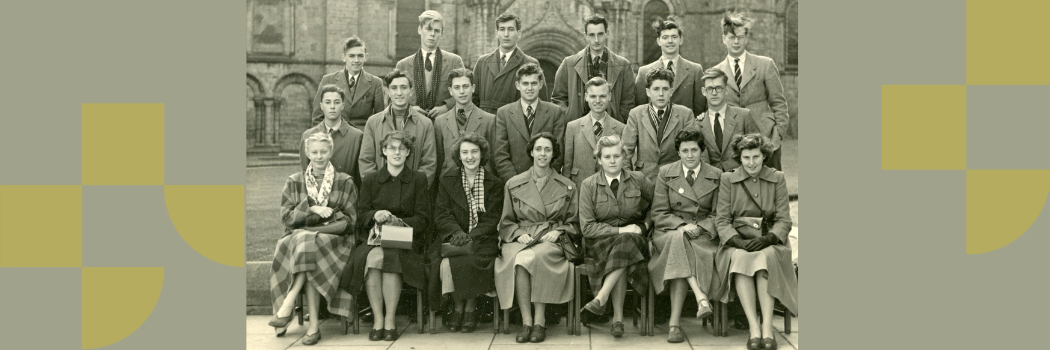‘Fabulous, formidable and visionary’: a television pioneer with a career rooted in Durham.

As a University community, we were saddened to hear of the recent death of our alumna and honorary graduate Biddy Baxter MBE. Her time spent in Durham in the 1950s played a formative role in an impressive career that influenced the lives of many young people.
Biddy Baxter (Social Studies, St Mary’s College, 1952-55) left Durham determined to pursue a career in broadcasting at a time when the domain was more typically reserved for men. She joined the BBC in 1955, straight from university, as a radio trainee studio manager, creating sound effects. She was promoted to producing Schools Junior English programmes and Listen with Mother in 1958. Soon after, she moved from radio to children’s television.
Biddy took over as editor on BBC flagship children’s television show Blue Peter in 1962. Blue Peter is currently the longest running television show in the world. At its peak, the magazine-style show was broadcast live in three teatime episodes on BBC One to eight million viewers.
From the outset, Biddy began to introduce changes that she believed could make a real impact on the everyday lives of a post-war generation of children.
Three blissful years at Durham
After growing up in a rural home in Leicestershire, Joan ‘Biddy’ Baxter attended a local grammar school before arriving at Durham’s St Mary’s College in 1952. Biddy described her time at Durham as "bliss". She maintained that her closest connections were made whilst at St Mary’s. She acknowledges this period as one where she came to realise that her comfortable childhood experience wasn’t typical of many in post-war Britain.
Although largely unscathed by war, 1950s County Durham was reeling with change. The mining industry was in the process of being dismantled. Whole workforces were forced to find alternative ways of making a living. In a 2012 interview with The Guardian, Biddy told of visits to local villages to hear friends preach. She said the hardship was plain to see, yet the welcome in North East England was always warm:
...inside these small homes there were always sensational high teas, platefuls of every imaginable cake under the sun, all home-made, of course. The hospitality was unbelievably generous and as rationing was still in operation, hugely appreciated by us.
Through Blue Peter, Biddy sought to address some of the challenges faced by children. She introduced the iconic Blue Peter badge to reward creativity and involvement, encouraged viewers to support good causes and introduced a dog as a substitute pet for those children for whom animals were forbidden.
Content ideas were collected from the audience, making the show personal and friendly. Crafts were created using leftover household items, meaning that even the poorest children could be included. Cooking items were simple and demonstrated equally by male and female presenters in an early example of gender equality.
Biddy Baxter has been described as "fabulous, formidable and visionary" by BBC Content Creator, Kate Phillips as she helped shape the early years of generations of children. She was awarded an MBE in Her Majesty The Queen’s New Year Honours List in 1981, and on leaving the show in 1988, she was presented with a gold Blue Peter badge.
Honorary Doctor of Letters
This was followed by a return visit to Durham in 2012 to receive an honorary Doctor of Letters. Our Vice-Chancellor and Warden, Professor Karen O’Brien, said:
“Biddy Baxter was an extraordinary broadcaster and advocate of social justice. We are proud that her experience at Durham contributed to her remarkable legacy.”
In 2013, she was given a special British Academy Film and Television Award (BAFTA). One former BBC chief told the Guardian at the time: "Blue Peter is a legend and she is Blue Peter."
Image: Biddy Baxter pictured front row, left, with a group of Durham University Freshers in 1951 (supplied by Biddy's biographer, Richard Marson).
Read more:
- about our alumni community
Durham University takes pride in the achievements and contributions of its 230,000 alumni and supporters. Stories that cite views, talks and published work reflect the individual's contribution in their personal or professional capacity and do not represent the University's position or endorsement.


/prod01/prodbucket01/media/durham-university/alumni-/page-header-banners/News-Banner.png)
.png)